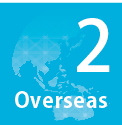Warning: include(/home/c9205967/public_html/kanamoto.ne.jp/include/menu_53annual_en.php): Failed to open stream: No such file or directory in /home/c9205967/public_html/kanamoto.ne.jp/en/pub/53/annualreport/06/index3.html on line 114
Warning: include(): Failed opening '/home/c9205967/public_html/kanamoto.ne.jp/include/menu_53annual_en.php' for inclusion (include_path='.:/opt/alt/php82/usr/share/pear:/opt/alt/php82/usr/share/php:/usr/share/pear:/usr/share/php') in /home/c9205967/public_html/kanamoto.ne.jp/en/pub/53/annualreport/06/index3.html on line 114
Feature

Infrastructure demand in ASEAN countries will expand against the backdrop of rapid, stable economic growth
Stable growth expected for ASEAN
Infrastructure construction projects are being carried out vigorously in Asian countries against the backdrop of rapid economic growth and urbanization. China, the world’s second largest economic power, and India, which will have the world’s largest population in the 2020s, are increasing their presence, together with ASEAN (Association of Southeast Asian Nations). According to the World Economic Outlook released by the International Monetary Fund (IMF) in October 2017, ASEAN is expected to maintain an economic growth rate in excess of 5%, while its working-age population is expected to continue growing stably in the future as well.
In addition to the branches it has already established in Shanghai, Hong Kong, and Singapore, since 2015 the Kanamoto Group has strengthened its focus on ASEAN and has established new joint venture companies in Indonesia, Vietnam, Thailand, and the Philippines.
Infrastructure construction in ASEAN countries is proceeding at a vigorous pace
In Singapore, in addition to the large-scale redevelopment of the North Region and development of the Marina South district based on the land development basic plan (Master Plan 2013) announced by the Urban Redevelopment Authority (URA), work is also progressing on the plan to extend the total length of the Mass Rapid Transport (MRT) network to approximately 360km, or double the current amount of track, by 2030. In Indonesia, the government currently is implementing its National Medium Term Development Plan to drive infrastructure investment, with total funding equivalent to 44 trillion yen over the five-year period from 2015 through 2019, focusing on electric power, ports, shipping, roads, and housing as priority sectors. Whether it is Lach Huyen Port infrastructure development or sewer and drainage system construction in Vietnam, works such as double-tracking of national railway lines or the urban rail transit and expressway network construction being planned for the Bangkok metropolitan area in Thailand, or the road map for implementing infrastructure development with a value of seven trillion yen by 2030 that has been approved in the Philippines, vigorous construction demand is anticipated in the ASEAN countries where the Kanamoto Group has opened bases.
In the future Kanamoto will strive to develop business related to the expansion of infrastructure demand in ASEAN countries, while maintaining and expanding each company’s operating results and deepening cooperation with each overseas partner company.

Essential information on each country where the Kanamoto Group is developing bases and main projects

Economic outlook for leading advanced countries and leading emerging countries (Compared with prior year/As of October 2017)

* Indonesia, Malaysia, Philippines, Thailand, Vietnam